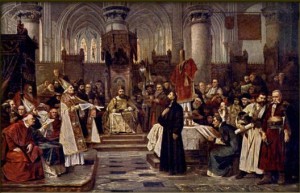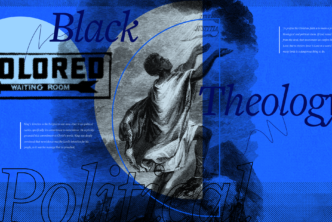“Lord Jesus, it is for thee that I patiently endure this cruel death. I pray thee to have mercy on my enemies.”—The last words attributed to John Huss
At the end of the fourteenth century, John Wycliffe’s influence was beginning to permeate the Christian world. Wycliffe’s convictions, such as his affirmation of the priesthood of every believer and his belief in the right of every believer to have access to Scripture in his or her own language, ran contrary to the era’s religious culture.
Wycliffe’s ideas were by no means universally popular. It is said that, upon reading Wycliffe’s works, an indignant scribe in Bohemia (now part of the Czech Republic) responded, “O good God, do not let this man come into our beloved Bohemia.” Wycliffe’s influence couldn’t be stopped, though, and his teachings circulated into Bohemia in the 1380s.
John Huss (born in Bohemia in 1369) discovered Wycliffe’s teachings while at the University of Prague. Huss went on to be ordained as a priest and, at the turn of the century, made rector of the University. Although many of Wycliffe’s works were denounced by the church, Huss helped translate and distribute Wycliffe’s work.
The Bethlehem Chapel, where Huss took over preaching duties, soon became a platform for Huss’ reform-minded teachings.
It wasn’t entirely Huss’ reformist thinking that put him outside the church’s good graces. Complex political and ecclesiastic issues, including an attempt to depose two popes (Benedict XIII and Gregory XII) and elect a third (Alexander V), were creating turmoil in the church. With King Wenceslaus of Bohemia, Huss backed this new pope. But when Huss took a stand against indulgences being sold to finance Alexander’s crusade against the other popes, he angered Wenceslaus and found himself at odds with the entire leadership of the church—with no king to protect him. Huss was excommunicated and forced into exile.
In 1414, the Council of Constance was organized to put an end to the church’s papal controversy. Huss was called before the council to give an account of his doctrine. Although he attended under the promise of safety, he was immediately arrested. During Huss’ incarceration, the council declared Wycliffe a heretic (May 4, 1415). Wycliffe’s books were burned and his body was exhumed and incinerated, his ashes thrown into the river.
Huss was brought before the counsel, and his beliefs—Christ (not the pope) being head of the church; predestination; separation of church and civil power; a belief that communion be available in both bread and cup to all (wine was often withheld from the laity)—were enough to have him condemned as a heretic.
On July 6, 1415, Huss was given an opportunity to recant. When he refused, he was taken to the cathedral, stripped, and led to the courtyard. Tied to the stake and given one last chance to renounce his beliefs, Huss responded, “Lord Jesus, it is for thee that I patiently endure this cruel death. I pray thee to have mercy on my enemies.” Peter of Mladonovice, a follower of Huss and witness to his execution, wrote that Huss sang Psalms while being engulfed by flames.
Huss’ execution started a rebellion. His followers (called Hussites) defeated many of the emperor’s attacks and continued to call for reforms. Hussite thought didn’t just outlive its founder—it went on to change the world. Wycliffe’s and Huss’ radical ideas were soon fanned into flame by Martin Luther.
Get the John Huss Collection today.





